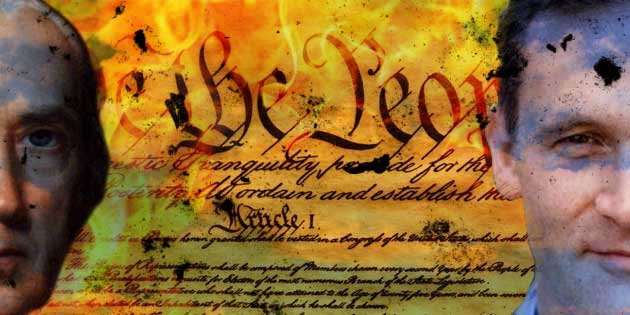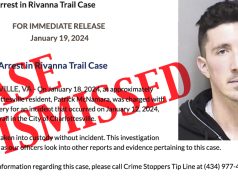A recent opinion issued by Democrat Attorney General Mark Herring validates legal critics of Charlottesville’s draconian, newly adopted “Council Meeting Procedures.”
Herring was asked by Virginia Delegate Rick Morris (R-64) if “certain rules of the Franklin City School Board restricting the speech of speakers at public meetings violate the free speech rights of speakers.”
The Franklin rules prohibited speakers from discussing specific personnel or engaging in “personal attacks” against division employees or other persons.
These mirror the Charlottesville dictates, which forbid, among other things “defamatory attacks on individuals or groups.”
In addressing the Franklin situation, Herring cited Baca v. Moreno Valley Unified School District and Leventhal v. Vista Unified School District, as he ruled as unconstitutional the Franklin prohibition on naming individuals before the board:
“I conclude that the School Board may not constitutionally bar speakers from discussing personnel issues or identifying individual school employees or officials during public session.”
Herring also struck Franklin’s banning of so-called “personal attacks” citing Bach v. School Board of the City of Virginia Beach:
“[C]itizens may see no distinction between stating, ‘the principal is a liar’ and ‘the principal lied to us about spending the money.’ According to the [School Board’s] interpretation, the latter would be acceptable but the forn1er forbidden ….” In accordance with that federal judicial precedent, I conclude that barring “personal attacks” is not constitutionally permissible.
The Attorney General concludes with a rebuke of the Franklin City School Board and by extension, of Mayor Mike Signer and the Charlottesville City Council (Bob Fenwick, who did not support the measures, excepted):
Freedom of speech is essential to the maintenance of a free society. For the reasons stated. it is my opinion that (I) the blanket prohibitions in the Rules against speech on “specific personnel or student concerns” and speech identifying school officials or employees may not constitutionally be applied so as to bar speakers from discussing specific school employees or officials during open meetings, and (2) the prohibition against all “personal attacks” is not constitutionally permissible.
Charlottesville can’t say that it wasn’t warned.
In a March 9 letter to City Council, renowned civil liberties attorney and founder of the Rutherford Institute, John Whitehead, admonished Mayor Signer and his accomplices on a number of constitutional issues regarding the new council speech restrictions, in which Whitehead specifically addressed the “defamatory attacks” provision:
Council also has declared that “improper comments . . . are not permitted,” including “vulgar language” and “defamatory attacks on individuals or groups.”
Plainly, these terms are ambiguous and vague, vesting the Council with a power of censorship that violates the First Amendment. A fundamental constitutional principle is that laws and rules must not grant unfettered discretion to a governmental person or entity to determine what may or may not be said in a public forum. Vesting the government with standardless discretion gives it the power to discriminate against unpopular viewpoints. This is precisely the danger to the rights of citizens created by the “improper comments” rule; the words “vulgar” and “defamatory”
are so ambiguous that there is a real danger that Council could use the rule to silence speakers for viewpoint discriminatory reasons. Indeed, this rule would have a chilling effect on speech of legitimate relevance to a public meeting as speakers seek to avoid making “improper comments.”This threat of censorship is contrary to the First Amendment because it allows for censorship of speech by government officials on the basis of disagreement with the speaker’s message. [emphasis added]
Whitehead’s closing paragraphs warned the council about their unwarranted and lawless restrictions:
Instead of placing restrictions on citizens’ ability to engage with their representatives at council meetings, the Council should be seeking to maintain an open and robust exchange of views with the people of Charlottesville.
The limits on speech imposed by the recently adopted rules are contrary to the fundamental principle that the activities of elected representatives be open and transparent to citizens and that the public have a right to actively and effectively engage with those representatives.
For citizens to feel vested in their government, they must know that government meetings are conducted in a transparent manner and that citizens are free to express their views to their representatives. Therefore, we urge the Council to revoke the rules it has adopted and thereby affirm the Council’s commitment to open, responsive government and ensure that Council meetings remain a forum for free speech.
Charlottesville City Attorney Craig Brown’s feeble attempt to defend Signer’s oppressive anti-speech policy, notwithstanding, the Charlottesville rules clearly violate the United States Constitution.
Charlottesville Mayor Mike Signer, who initiated the new policies—and then claimed they would have been supported by James Madison—should apologize to his constituents for his legal folly and immediately call for repeal of this self-imposed constitutional abridgment.









Greene County has similar language in section 4.2 of its bylaws guiding public comment for BOS meetings:
Address the Board or staff in a disrespectful manner;
Make personal attacks against or accusations about any member of the County Board, staff or other member of the public;
Use profanity or vulgar language;
Campaign for public office;
Promote private business ventures;
http://www.greenecountyva.gov/government/local/board-supervisors/board-agendas-minutes/672-board-of-supervisors-amends-rules-for-matters-from-the-public/file
Something that is just as egregious but not addressed that is even more stifling to free speech is this “lottery” they have come up with. I researched and over the last 40 meetings less then half had all 12 slots were filled. Now all the sudden we get 25-30 people who want to sign up? And the way they “arrange” the “winners” is suspect to the out come of this lottery.
And if you aren’t lucky enough to get picked, your free speech isn’t just stifled as to who you can talk about…your free speech is STOPPED…how is that fair?
Agreed 100%, John.
And if you aren’t lucky enough to get picked, your free speech isn’t just stifled as to who you can talk about…your free speech is STOPPED…how is that fair?
If they’re stacking the deck so conservatives can’t speak, that’s one thing, and I wouldn’t put it past them. But free speech doesn’t entail having the right to speak any time, anywhere, or else I’m going to start calling the Schilling Show every day and demanding to be put on right that moment. I doubt the Daily Progress and Cville Weekly print every letter they get.
It’s true that these examples are of privately owned entities, while city government technically belongs to the people, and we the people should have access to it. But we can write letters and emails, and we can address city officials publicly in other forums. In principle, City Council is not responsible for sitting and listening while everyone has their say at every meeting.
I’m not defending Signer’s attempt to stifle criticism. That does stink. But the lottery system can be seen as small-c democratic in spirit, because it serves people who can’t get to the meetings early.